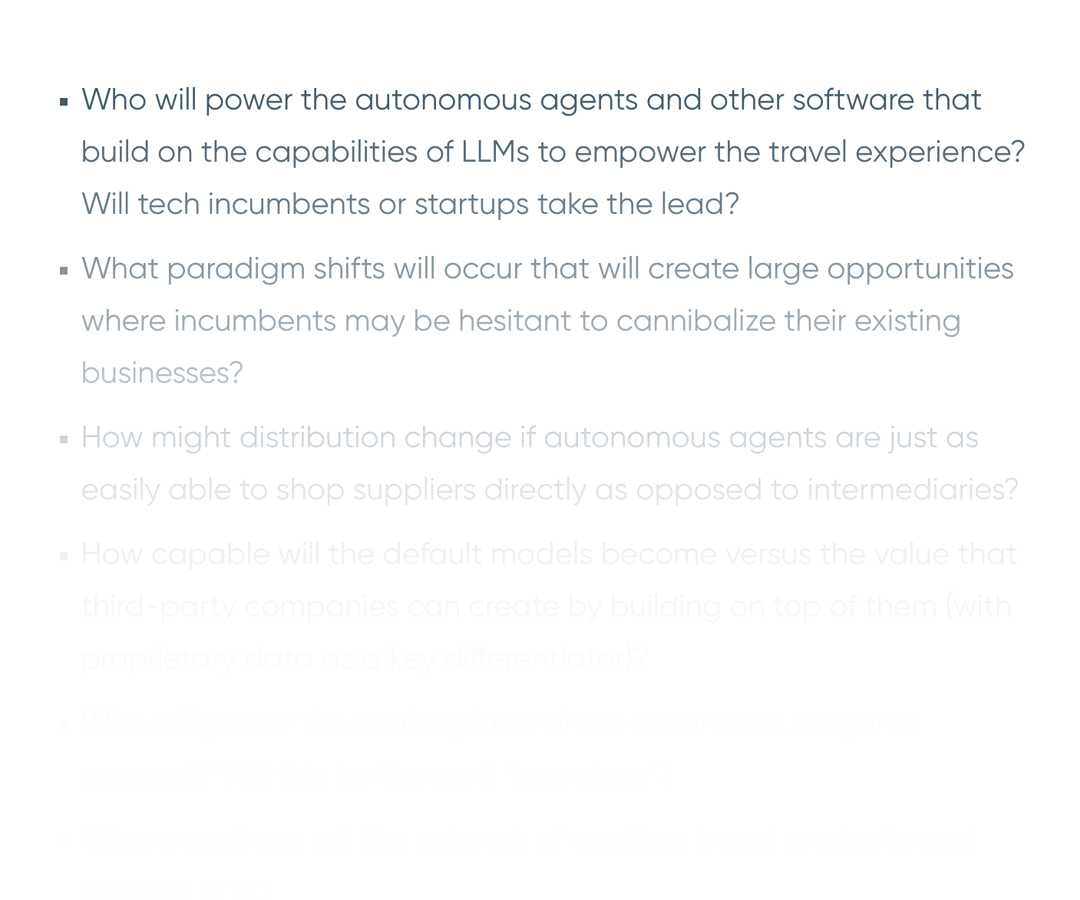4 ways GenAI will impact travel startups
A preview of Phocuswright's The Impact of GenAI on Travel Startups, a companion report to The State of Travel Startups 2024

We may be standing on the precipice of an exhilarating new phase of travel startup investment. But will the next era look like the last? All indications are that it could be drastically different for both startups and their investors.
Across almost 800 exits tracked, the average time for travel startups to be acquired is 6.7 years from their founding.
Though plenty have taken 10, 20 or more years, there are many small acquisitions in travel that are done relatively quickly as acqui-hires or strategic plays. Regardless, when thinking about exits, both entrepreneurs and investors need to plan many years ahead. But because GenAI has the potential to be so disruptive in the coming years, planning is becoming increasingly difficult. This creates an abundance of both uncertainty and, in tandem, opportunity.
Get the full report The Impact of GenAI on Travel Startups here.
One of the most dramatic and profound visions of how differently companies will operate in the future comes from Jensen Huang, CEO of Nvidia. The GPU maker is powering the AI revolution through its industry-leading chips, a mission that recently helped to recently surpass Apple to become the most valuable company in the world. In his keynote at the Nvidia GTC (GPU Technology Conference) in March 2024, he spoke about his belief that in the future, enterprise software will essentially be a collection of Large Language Model (LLM)-powered chatbots strung together to complete a task, saying, "It is unlikely that you'll write it from scratch or write a whole bunch of Python code or anything like that. It is very likely that you assemble a team of AI.”
In what could be the first glimpse of this vision playing out, in August 2024 fintech firm Klarna announced that it was ending its partnerships with two of the biggest enterprise software providers, Salesforce and Workday, citing its aim to reimagine its workflows and automate its services with AI. The long-term implications for SaaS/PaaS (Software as a Service/Platform as a Service) companies in travel could be significant; in 2023 this category jumped to account for more than a 12% share of all travel-related funding across horizontal categories, up from a previously consistent average of 7-8%.
In the June 2024 Phocuswright analysis True Automated AI in Travel Is Coming, the concept of chatbots capable of learning, making decisions and executing actions was referred to as “autonomous agents.” The report details potential impacts on the travel industry, the general business environment, the workforce and the world at large. It is highly recommended reading to fully understand some of the concepts that follow.
Since that report published, another significant AI milestone has taken place: the September 2024 launch of o1 by OpenAI. This represents a new series of AI models, which are “…designed to spend more time thinking before they respond. They can reason through complex tasks and solve harder problems than previous models...”
While it’s still early days in terms of seeing swarms of autonomous agents able to handle complex tasks, given the pace at which GenAI is moving, we are likely to be much further along sooner than we think.
What will all of this mean for startups?
A few initial theories can be drawn:
1. If LLMs become the core infrastructure layer, as Jensen Huang predicts, LLM-native companies, building without technical baggage and thinking carefully about how to build for the world as it may look in six or seven years (give or take!), could gain a distinct advantage over their legacy competition.
2. As LLMs become capable of handling increasingly sophisticated tasks, from building technology to creating marketing campaigns and analyzing business performance, startups of the future could be run far leaner, requiring fewer technology resources as well as employees in many different functions. Thus, they could require less capital going forward.
- Tools like Replit Agent are a significant leap forward in rapid prototyping and the building of simple (for now) apps, representing a democratization of software creation.
3. The melting away of technical and resource constraints could trigger an explosion of new companies, with a corresponding increase in competition as a direct byproduct. This level of expansion could be similar to how the internet (and then cloud computing) lowered the barrier to starting a company, but on steroids.
4. The implications of this type of shift in the way companies are built, run and marketed are enormous.
The full report analyzes the following examples of how omni models could be useful in customer service and in-destination:
OpenAI's demo of placing an order via phone
Source: https://x.com/tsarnick/status/1841229808510042356
Facilitating a conversation between two people who don’t speak the same language (e.g. a traveler and a hotel desk clerk, either on the phone or in person) using real-time translation, via OpenAI:
Source: https://www.youtube.com/watch?v=c2DFg53Zhvw
Taking a guided tour of a city by allowing a traveler’s phone or smart glasses to act as their tour guide, guiding them and narrating the journey as a human would through its “vision” of what the traveler is seeing, via OpenAI:
Source: https://www.youtube.com/watch?v=KwNUJ69RbwY
The million, or possibly billion-dollar questions provoked by the latest developments in AI are outlined in the full report.
While the prospect of companies running leaner may imply that less funding will be needed, the corresponding glut of competition, as well as the transformation in advertising dynamics, could mean that use of funds shifts. Thus, in the coming years, funds could be raised and deployed less for things like a large team of expensive developers, and more for where they will be sorely needed: customer acquisition and branding.
WEEKLY RESEARCH INSIGHTS
We dig deep to give you the data and trends that drive the travel, tourism and hospitality industry.
Get the latest in travel industry highlights with our free weekly research articles and more. Sign up to get the latest delivered directly to your inbox.
FOR MORE INSIGHTS
See all of Phocuswright's free research insights here.
Sign up to get the latest delivered directly to your inbox.
Open Access Research Subscription
Research is our priority. Our Open Access research subscription puts the world’s most comprehensive library of travel research and data visualization at your fingertips.
Clients have relied on Phocuswright's deep industry knowledge for over 25 years to power great decisions, help justify a pitch, build a strategic plan and elevate any presentation through trusted research and data. When companies and executives reference Phocuswright, they gain the trust of an industry keen on data, trends and analytics.
See the full benefits of an Open Access subscription here.
Contact Us
For any questions you may have, please call or email us at
📱 +1 860 350-4084
📧 info@phocuswright.com
About Phocuswright
Events
FAQ
Copyright
Contact Us
Research
News
Privacy & Terms
Press Room
Email Updates
Register for Phocuswright emails about research data, events and more:
A WHOLLY OWNED SUBSIDIARY OF
Copyright © 2024 by Northstar Travel Media LLC. All Rights Reserved. PO Box 760, Sherman, CT 06784 USA | Telephone: +1 201 902-2000
The Phocuswright Conference • Phocuswright Europe • Global Startup Pitch • Travel Tech Fellowship • Phocuswire • Web In Travel • Inntopia • Retail Travel • Hotel Investment












